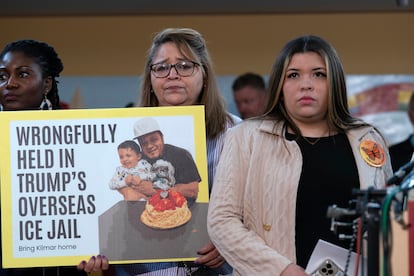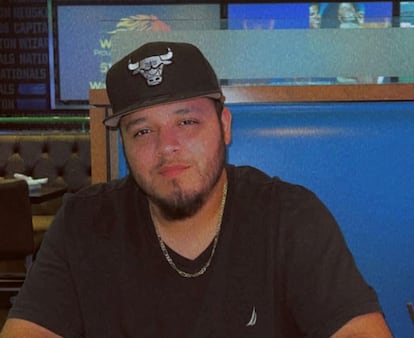Supreme Court tells Trump administration to ‘facilitate’ return of migrant wrongly deported to Bukele’s prison in El Salvador
The justices rejected the executive’s request and upheld the district judge’s ruling that deemed the expulsion of Kilmar Abrego García was ‘without legal basis’


The United States Supreme Court has told the Trump administration to facilitate the return of Kilmar Abrego García, the Salvadoran national living in Maryland who was mistakenly sent to a high-security prison in El Salvador. The Supreme Court’s decision conflicts with the actions of the executive branch, which has so far refused to take steps to return Abrego García to the United States, despite having acknowledged that his deportation was due to an “administrative error.”
The government had appealed District Judge Paula Xinis’s decision last Friday, which ordered the Trump administration to return Abrego García by Tuesday. At the executive branch’s request, Chief Justice John Roberts temporarily halted the order on Monday to review the case. In his ruling on Thursday, the Supreme Court acknowledged that part of the order will not be enforced, since the deadline has already passed. However, it told the government to follow the remainder of the order, in which the judge demanded that the government “facilitate” the release of Ábrego García in El Salvador and to ensure that his case proceeds as it would have had he not been improperly returned to that country. But the Supreme Court also noted: “The intended scope of the term ‘effectuate’ in the District Court’s order is, however, unclear, and may exceed the District Court’s authority.”
Maryland District Judge Xinis declared Abrego García’s transfer to El Salvador was “without legal basis” and demanded that the government “facilitate and effectuate” his return. Government lawyers appealed the ruling, arguing that no judge can dictate the country’s foreign policy, as cited in the Supreme Court ruling.
The Ábrego García case drew widespread attention after the government, for the first time, acknowledged that it had erred in deporting him. Public outrage intensified when, despite admitting the mistake, authorities announced they would take no steps to rectify it, arguing that the detainee was now under El Salvador’s jurisdiction. A judge had granted Ábrego García protection in 2019, explicitly prohibiting his deportation.

Despite this, on March 15, he was among 23 Salvadorans and 238 Venezuelans deported to El Salvador without a court order. The group was transferred to Cecot prison, the sprawling mega-facility built under Salvadoran President Nayib Bukele, which has become infamous for its harsh conditions and reported human rights abuses. To carry out the deportations, the government invoked the Alien Enemies Act of 1798 — a rarely used statute previously applied only three times in U.S. history, and solely during periods of armed conflict.
Abrego García lived in Maryland with his wife, a U.S. citizen, a disabled son, and two children from his wife’s previous relationship. On March 12, he was arrested while traveling in the car with his son, whom he had just picked up from his grandmother’s house. Immigration and Customs Enforcement (ICE) agents detained him on charges of belonging to the MS-13 criminal gang. His lawyers and family have denied he has any ties to the gang, which Trump declared a terrorist organization.
His only known run-in with the law occurred in 2019, when he was arrested along with three other men while looking for work outside a Home Depot store in Maryland. Abrego García was not charged with any crime, but was handed over to ICE, which initiated deportation proceedings. The government claimed that a reliable informant had identified him as a high-ranking MS-13 member. Six months later, a judge granted him a stay of deportation, understanding the risk he faced if he returned to his country. Abrego García arrived in the United States at the age of 16, fleeing death threats from the gangs that dominate El Salvador.
Since his deportation, there has been no news of him. His family and lawyers have mobilized supporters and politicians to demand his return. The case has made clear that, although the government claims it is only deporting criminals, the reality is that people with no criminal record have also been expelled. Family members and migrant advocates have reported that, in many cases, many arrests appear to be based solely on having tattoos allegedly associated with gangs.
Sign up for our weekly newsletter to get more English-language news coverage from EL PAÍS USA Edition
Tu suscripción se está usando en otro dispositivo
¿Quieres añadir otro usuario a tu suscripción?
Si continúas leyendo en este dispositivo, no se podrá leer en el otro.
FlechaTu suscripción se está usando en otro dispositivo y solo puedes acceder a EL PAÍS desde un dispositivo a la vez.
Si quieres compartir tu cuenta, cambia tu suscripción a la modalidad Premium, así podrás añadir otro usuario. Cada uno accederá con su propia cuenta de email, lo que os permitirá personalizar vuestra experiencia en EL PAÍS.
¿Tienes una suscripción de empresa? Accede aquí para contratar más cuentas.
En el caso de no saber quién está usando tu cuenta, te recomendamos cambiar tu contraseña aquí.
Si decides continuar compartiendo tu cuenta, este mensaje se mostrará en tu dispositivo y en el de la otra persona que está usando tu cuenta de forma indefinida, afectando a tu experiencia de lectura. Puedes consultar aquí los términos y condiciones de la suscripción digital.








































